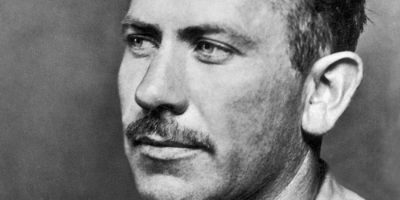Top 20 Sensational facts about Booker T. Washington
*Originally published by Lynn in November 2022 , Updated by Diane C in January 2022
Booker T. Washington was an American educator, author, orator, and adviser to several presidents of the United States. He was from the last generation of black American leaders born into slavery and became the leading voice of the former slaves and their descendants.
He was one of the founders of the National Negro Business League. His base was the Tuskegee Institute, a normal school, later a historically black college in Tuskegee, Alabama, at which he served as principal. His work in the field of education helped give access to new hope for thousands of African Americans.
Below are the top 10 sensational facts about Booker T. Washington;
1. The first African American to be depicted on a United States postage stamp
President Franklin D. Roosevelt received many petitions throughout the 1930s to feature Booker T. Washington on a stamp, and in 1938, he acknowledged that Washington deserved consideration to be featured as part of the Famous Americans series.
On April 7, 1940, Washington became the first African American to be depicted on a United States postage stamp. The stamp was part of the Postal Service’s Famous Americans Series. Tuskegee Institute owns the first sheet of Booker T. Washington stamps sold.
Washington was again honored by the Postal Service in 1956 for the 100-year anniversary of his birth, with a stamp featuring an image meant to represent the cabin where he was born.
2. Ever wondered what the T. in his name stands for?
The “T” in Booker T. Washington stands for Taliaferro, its meaning in Italian is “iron-cutter.” During his childhood as a slave, he was not aware of this name, and it is only after gaining his freedom and joining school that his mother informed him that she had originally given him the name “Booker Taliaferro” at the time of his birth, but his second name was not used by the master.
Taliaferro was a relatively common surname in Maryland and Virginia, and the name itself can be traced to one Bartholomew Taliaferro, who immigrated to London from Venice in the 1560s. He chose the name Washington as his surname when he enrolled in school.
3. A lot of mystery surrounds his birth
What we know for certain is that Booker was born into slavery to Jane, an enslaved African-American woman on the plantation of James Burroughs in southwest Virginia, near Hale’s Ford in Franklin County.
The exact date, month and year of his birth are unknown, although evidence emerged after his death that he was born on April 5, 1856. He did not know who his father was, although it was rumored to have been a white man who resided on a neighboring plantation. The man played no financial or emotional role in Washington’s life.
4. An entrance exam like no other
In 1872, at the age of sixteen, Booker T. Washington enrolled in the Hampton Normal and Agricultural Institute, a newly established school for former slaves in southeastern Virginia. As an entrance exam, Miss Mackie, the head teacher of the school, asked Booker to sweep the floor.
Washington took it as a challenge, sweeping it 3 times, mopping it and washing the walls. Miss Mackie then inspected his work with a spotless, white handkerchief. Impressed with his hard work, she let Washington into the school.
However, Washington worked as a janitor to pay the cost of his room and board. Washington went on to graduate from the institute with honors.
5. Turn of the tide
From being a mere slave who had no rights to being an influential person who gets the opportunity to dine with the nation’s most powerful individual seems like an impossible feat. However, in October 1901, President Theodore Roosevelt invited Washington to dine with him and his family at the White House.
Although Republican presidents had met privately with black leaders, this was the first highly publicized social occasion when an African American was invited there on equal terms by the president. The following day, the White House released a statement with the heading, “Booker T Washington of Tuskegee, Alabama, dined with the President last evening”.
6. A reminder of how little progress was made in the nation
After the announcement of President Theodore Roosevelt dinner with Washington, there was widespread condemnation of the president from southern politicians and press. James K. Vardaman, a politician from the U.S. state of Mississippi and the Governor of Mississippi from 1904 to 1908, described the White House as “so saturated with the odor of the nigger that the rats have taken refuge in the stable.”
While Senator Benjamin Tillman of South Carolina said, “The action of President Roosevelt in entertaining that nigger will necessitate our killing a thousand niggers in the South before they will learn their place again.”
Seeking to put out the fire, Roosevelt’s staff backpedaled, suggesting the dinner hadn’t taken place, or that it had been a lunch, and that in any case Roosevelt’s wife and daughters were not present. Moreover, no other African American was invited to dinner at the White House for almost the next thirty years.
7. Take a closer look before you judge
Washington faced a lot of criticism from other Black leaders for telling Black Americans to concentrate on working hard and improving their own economic conditions through education and entrepreneurship, instead of directly challenging segregation or fighting for political and social rights.
However, despite his public comments that looked to avoid confrontation, Washington was secretly involved in financially supporting and contributing to many legal challenges against segregation and voter suppression. He also secretly invested in key Black newspapers and publications around the country to help bring attention to these issues and to help combat injustice and inequality.
8. A good joke can make an enemy laugh
Booker T. Washington became well known as a powerful public speaker to both black and white audiences alike. He often used humor as an instrument to put people at ease, especially the ones who disagreed with his views.
According to his contemporary James Hardy Dillard, Washington “could not only tell a good joke well, but tell what was only the shadow of a joke so well that his audience would be shaken with laughter”.
Many of Washington’s recorded one-liners utilize racial stereotypes and dialect that would be seen as inappropriate today.
9. Tuskegee was his home
In 1915 Washington’s health was deteriorating rapidly, he collapsed in New York City and was diagnosed by two different doctors as having Bright’s disease, an inflammation of the kidneys, today called nephritis.
He was told he had only a few days left to live, Washington expressed a desire to die at Tuskegee. He boarded a train and arrived in Tuskegee shortly after midnight on November 14, 1915. Washington died a few hours later at the age of 59. His funeral was held on November 17, 1915, in the Tuskegee Institute Chapel.
10. Divided opinion on Booker T. Washington
The Atlanta Compromise and his views that the blacks first needed to prove that they were responsible citizens before gaining equal rights, are now controversial and criticized by many, including African Americans.
However, Washington is held in high regard by business-oriented conservatives, both white and black.
11. He was a prolific author
Booker T. Washington wasn’t just a leader and educator; he was a gifted writer whose words resonated both within and beyond Black communities. His most celebrated work, “Up from Slavery”, published in 1901, is an autobiographical masterpiece.
It’s not just a captivating account of his journey from enslaved child to influential figure; it’s a window into the realities of post-Reconstruction America, the challenges faced by Black communities, and the unwavering hope for progress. He writes with unflinching honesty about the brutalities of slavery, the limitations imposed by segregation, and the power of education and self-reliance.
12. Booker T. Washington had a family
Despite his demanding workload, Washington prioritized family life. He married three times and fathered six children, demonstrating the importance of strong family units as pillars of Black communities.
His first wife, Fannie Norton Smith, was a student at Hampton Institute who shared his passion for education. His second wife, Olivia Davidson, served as Tuskegee’s assistant principal and played a crucial role in developing its academic programs.
13. Booker had a number of illnesses in his lifetime
Chronic asthma and rheumatism plagued Booker T. Washington throughout his life, constantly testing his physical limitations. He suffered severe breathing difficulties, particularly in humid climates, and joint pain that often restricted his movement. Yet, Washington refused to let illness deter him from his goals.
He meticulously managed his health, adopting breathing exercises and dietary restrictions, even experimenting with innovative treatments like electric baths. This unwavering dedication extended to his work schedule, adjusting travel plans and delegating tasks during flare-ups, ensuring he maximized his time and impact.
14. His commitment to uplifting Black communities wasn’t confined to Tuskegee

Photo by Ehimetalor Akhere Unuabona on Unsplash
Washington actively supported other Black educational institutions and initiatives, such as Hampton Institute and the National Afro-American League. He believed in creating a network of self-sufficiency, and his philanthropic efforts furthered educational opportunities and economic prospects for Black Americans across the nation.
He was a founding member of the National Afro-American League, championing economic self-sufficiency through initiatives like business development and land ownership programs.
15. Tuskegee University stands as a testament to Washington’s vision
It has educated generations of Black professionals in various fields, from business and engineering to medicine and education.
Tuskegee continues to be a vital force for educational equity and a source of inspiration for communities striving for upward mobility. The university’s commitment extends beyond traditional classrooms, addressing contemporary challenges through programs in cybersecurity, sustainability, and social justice.
16. He documented his life through photography
Throughout his life, Washington meticulously documented his experiences through photography. He understood the power of visual storytelling to challenge prejudices and stereotypes about Black Americans.
His extensive collection of photographs, now housed at Tuskegee University, offers a glimpse into his personal life, educational endeavors, and interactions with prominent figures, providing a human dimension to his historical impact.
17. He was a fundraising genius

Photo by Katt Yukawa on Unsplash
Despite encountering resistance, Washington’s charisma and persuasive skills won over powerful white philanthropists like Andrew Carnegie and John D. Rockefeller, securing millions of dollars that fueled Tuskegee’s growth and success.
Planning a trip to Paris ? Get ready !
These are Amazon’s best-selling travel products that you may need for coming to Paris.
Bookstore
- The best travel book : Rick Steves – Paris 2023 – Learn more here
- Fodor’s Paris 2024 – Learn more here
Travel Gear
- Venture Pal Lightweight Backpack – Learn more here
- Samsonite Winfield 2 28″ Luggage – Learn more here
- Swig Savvy’s Stainless Steel Insulated Water Bottle – Learn more here
Check Amazon’s best-seller list for the most popular travel accessories. We sometimes read this list just to find out what new travel products people are buying.






















